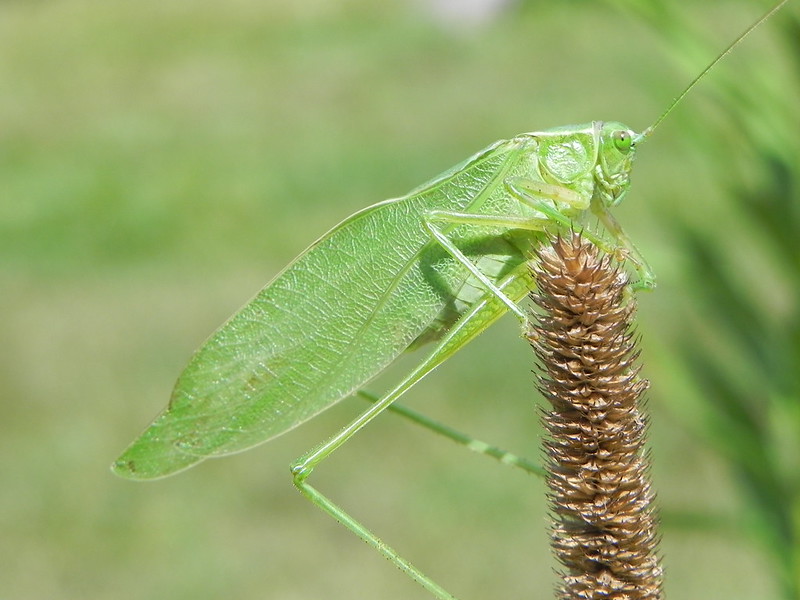By Emma Roth, Nature Educator
Nature is noisy. Tweeting birds, chirping frogs, crunchy leaves, dripping water, and wind, the list goes on. For nature lovers, these sounds are a form of music. Like music, they can convey emotions and meanings as the music changes with the time of day, seasons, or weather.
Everyone has certain sounds they gravitate towards, or that hold extra meaning to them. Some people revel in the song of their favorite bird, or the swish of long grass in the wind. Others may listen with reverie to the hooting of an owl or the distant yelps of a coyote in the dark.
There are many sounds I love in nature, but it’s the chorus of the katydid that grabs at my heartstrings. The ch-ch-ch sound of the males calling in late summer evenings and nights is a sign that the hot days of summer are nearly over and fall is on the way. It also instantly transports me back into memories of my childhood.
I was lucky enough to grow up in a neighborhood filled with families and other kids around the same age. Even luckier, we had parents that not only encouraged, but actively worked towards a community-centered neighborhood. We would run through all the yards playing games or catching toads, and enjoyed block parties with good food, bike races, and even clowns (which I was not a fan of).
For me, the most important event in our neighborhood calendar was the yearly camping trip. We would load up tents, campers, and all the necessary accoutrements and head off to a campground for a weekend of family fun in the woods.
I was quite young when we did these trips. They stopped when I was around 9 or 10, but I still have wonderful memories of the days spent searching for frogs and newts in the swamps of a state park and evenings spent eating s’mores around a large group campfire. In the later years of this tradition, the kids would sometimes all pile in one big tent for the night, having a large group sleepover. For a nature-loving child, it was heaven.
While I don’t remember the logistics of these trips too well, we must have done them during late summer, because the strongest memories I have are lying awake at night, listening to the katydids sing outside the canvas walls of my family’s camper trailer, the same camper my grandparents would take my dad and aunt camping in during their childhood. The rhythmic chirping after a long day of exploring nature with friends was the perfect sleep-inducing combination.
I’ve met many people who do not enjoy the katydid song. Objectively, it’s not very pretty, or pleasant to listen to. There are no lilting melodies or whistles. It’s harsh and repetitive and can get tiring after a while. If I didn’t have such good memories tied to the chirp of katydids, I don’t think I would enjoy them as much as I do.

Even if you don’t like the noise, katydids are remarkable animals. Our local katydids are masters of camouflage. Like many members of the cricket family, they are bright green in color, blending in with the plants they call home. They take it a step further, however, as their wings perfectly mimic leaves, veins and all. During the day, they are nearly impossible to see.
While their diet consists mostly of plants such as leaves, grass, and fruit they are also effective predators, eating other small insects, insect eggs, and snails. Although they are predators, they are also good prey for larger animals like birds, frogs, and bats.
To this day, listening to the first katydids of the season is special. It’s a sound that always makes me stop in my tracks, listen, and smile with the joyful memories it brings. It gives me the urge to drop whatever I’m doing, grab a tent and sleeping bag, and head for the woods. While that’s an urge I can’t always act upon, it’s one I hope never goes away.
Audubon Community Nature Center builds and nurtures connections between people and nature. ACNC is located just east of Route 62 between Warren and Jamestown. The trails are open from dawn to dusk and birds of prey can be viewed anytime the trails are open. The Nature Center is open from 10 a.m. until 4:30 p.m. daily except Sunday when it opens at 1 p.m. More information can be found online at auduboncnc.org or by calling (716) 569-2345.
Learn more about how sounds impact memory at https://www.livescience.com/8426-brain-link-sounds-smells-memory-revealed.html
Learn more about katydids at https://mdc.mo.gov/discover-nature/field-guide/katydids
Listen to a katydid sing at https://youtu.be/cxIzRw1BToI?si=q6Qkpvnj9IJY_ieF



Recent Comments